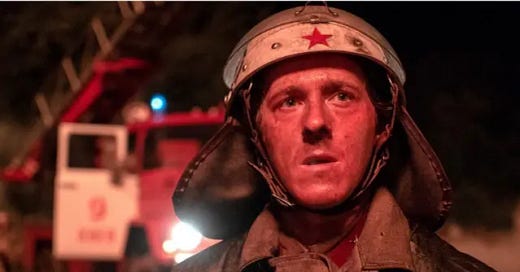Watching Chernobyl in Troubled Times
Last night I decided to rewatch the HBO miniseries Chernobyl, partly so I could introduce it to my wife, but mostly because it feels especially relevant right now. It’s a show about people in a dying, sclerotic empire trying to do their best against long odds to limit the human damage of failures of the dysfunctional regime they live under. It’s also about how authoritarian regimes’ quest to deny the truth sometimes comes up against very hard limits. That feels awfully relevant, too.
My rewatch is only through three episodes so far, but multiple moments have moved me to tears. Despite the show’s well-deserved condemnation of the head in the sand, ass covering response of much of the Soviet leadership, it is mostly a humanistic story about ordinary people rising to meet an unfathomable challenge. At one moment, the scientists realize that three people need to go into the bowels of the plant to release a massive amount of radioactive water so it does not contaminate the drinking supply and cause mass death. Gorbachev gives his assent for three people to be sacrificed, but the workers at the plant are understandably reticent to volunteer to get a bonus of 400 roubles. At that moment the official Boris Shcherbina, played remarkably well by Stellan Skarsgard, tells the men that he knows that the three who volunteer will likely die, but that millions of lives are in danger and somebody has to save them. At that point three men bravely stand up, aware they are potentially signing their own death warrants. They understand that there’s something bigger at stake here.
In another scene the scientists realize they need to get a radiation reading from inside the reactor. Even when using a lead-plated truck the risk is tremendous. When the idea is floated to one of the main military officers on the scene his reaction is immediate: I will do it. How could a leader ask someone to do something that they themselves wouldn’t do? There’s also the scene where coal miners are told they have to go assist with the crisis at Chernobyl. Initially they defy the soldiers present to shoot them, but eventually they come around. The physical danger of the mission means nothing to them, they just want to be talked to with honesty.
The humanity of these sacrifices prompted my tears, but also sadness at the pervasive nihilism of my own society. In modern America civic virtue is mocked and sacrifice derided. We live under a soulless, “get that bag” ethos that’s like a parody of how Soviet propaganda once portrayed the United States. For years I said that America had entered its “Brezhnev Years” of long decline (now we are definitely in the collapse stage, lol.) By that I meant that the stagnating system was still running, but that most people no longer believed in the system’s underlying ideology. The Soviet Union collapsed because most of its citizens did not believe in Marxism-Leninism, and Donald Trump got elected because most Americans no longer believe in democracy.
In the scenes I described Chernobyl also shows how despite the repressive nature of Soviet communism, ordinary people often took its universalist, collectivist ideology very seriously. It’s one of the great tragedies of history, in fact, that a revolution intending on universal human liberation ended up sponsoring a failed police state. The United States has also often failed to live up to its creed, but the ordinary people who believe in it are the only real force capable of stymieing Trump and Musk’s assault on democracy.
What’s so moving about Chernobyl are the moments of heroism by regular people, in many cases done without anyone telling them to, like Ulana Khomyuk, the scientist played my Emily Watson who drives on her own from Belarus and defies the guards to convince people on the scene of her warnings of what they have misses. As at Chernobyl, we cannot wait for the bigwigs to solve the problem. The meltdown will get far out of hand if we delay. We do not need elite direction, people of good conscience just need to act.
Chernobyl is an example of how people can maintain their humanity in the most trying circumstances. In this moment, when humanity appears to be getting ruthlessly squeezed from public life by an all-pervading nihilism, maintaining it is all the more crucial.



